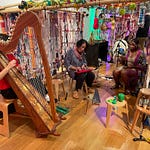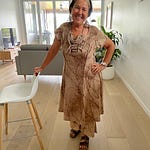Today on Streets of Your Town podcast we talk to former Senator Natasha Stott-Despoja about her appointment to a top United Nations role aimed at ending discrimination against women.
“I think I’m still in happy shock, Nance. It was a long time coming because the campaign has been a gruelling one,” Natasha says.
“I’m very happy and delighted and honoured and particularly following in the footsteps of the distinguished Elizabeth Evatt who was the last Australian to serve on the committee.”
This episode is brought to you in conjunction with Griffith University’s Gender Equity Research Network, as a special co-production.
The interview with Natasha Stott-Despoja coincides with the international campaign of 16 days of Activism Against Gender Based Violence, which started on November 25 on the International Day for the Elimination of Violence Against Women.
Natasha starts her four-year term on the committee in January as one of 23 independent experts monitoring the efforts of countries around the world to improve gender equality.
“In the old world pre-Covid I’d be spending a bit of time in Geneva,” she says.
“Now I think I’ve got a lot of zoom calls in my future at probably the worst time difference you can imagine.”
Natasha tells us how the need to protect women’s rights is even greater in the wake of coronavirus, and how she keenly feels her responsibility in her new role as the only expert on the committee from the Oceania region.
“I just think Covid should shift everyone’s thinking and certainly that’s the view I will take to the committee,” she says.
“Obviously there’s been an impact on discrimination generally so people, particularly those already dealing with poverty or disability or women and girls generally, have been affected disproportionately in this crisis.
“In our region we’ve already got some of the highest rates of violence in the world against women and girls and some of the lowest representation particularly in parliaments.
“It is shocking. You’ve got to remember the issue of gendered violence is considered by the World Health organisation to be an epidemic. So across the globe you’ve got roughly a third of women on average who’ve experienced some form of violence, coercion, abuse or sexual violence.
“In Australia we know the statistics here—particularly in relation to domestic violence—we know police attend a domestic violence incident every two minutes on average, around 267 times a day.
“We know every week in Australia a woman dies violently and that’s usually at the hands of somebody she knows.
“There is an inextricable link between women in positions of power and parliament in particular and issues to address violence against women and children.
“The double standards that have existed and continue to do so for women in positions of power and parliament and public life in particular—its exhausting, it’s debilitating, and hopefully it’s changing.”
Natasha had hoped that free universal access to childcare in Australia would continue after the pandemic. “Why was it important in a pandemic but not considered important going forward?”
Despite all the statistics, Natasha still holds out hope that violence against women is preventable.
“It’s not an inevitable part of the human condition,” she says. “We can change lives—we can literally save lives, but it will take time. And I’ve been involved in legislative reform and I know that policy making literally takes time, but there’s nothing that takes as much time as cultural change and that’s the area we’re in.
“The biggest issue is changing behaviours and attitudes that compound and give rise to violence in the first place.”
Professor Susan Harris-Rimmer tells us how incredibly significant it is that Natasha was chosen as the first Australian in 28 years to join the UN Committee on the Elimination of Discrimination Against Women, otherwise known as CEDAW.
“It’s extremely significant because she’s actually elected as an independent expert,” Professor Harris-Rimmer says.
“It’s a really important position.
“Generally speaking Australia has not supported enough people in the UN system, so I’m hoping this is a sea change and we’re going to see more nominations for these important expert positions.
“She’s still very young. She’s still got heaps of history to make.
“It is a little bright spot in a terrible year. I was so very very proud and delighted because I know Natasha works so hard and she puts her heart and soul into every role she has. I think she’s going to bring something to that group.
“In a diplomatic and constructive ways she is always a force to be reckoned with."
The 16 days of Activism Against Gender Based Violence campaign ends on International Human Rights Day on December 10—highlighting that violence against women is a fundamental violation of human rights. You can take part by tweeting #16days, supporting a women’s group, or marching in your city.
Behind the scenes
As I mentioned last week, this interview with Natasha was the reason I had planned a trip to Adelaide for the weekend. But then coronavirus intervened, as it has for so many people this year.
But not to be defeated, I recorded the interview in my natty little home studio.
This is my favourite quote from Natasha from our interview. I hope you ponder it as I did.
“What gives me hope? The fact that so many people more than ever want change. People are open to debating these issues.
“For the first time in a long time, people are saying, oh I can actually make a difference myself. So if there’s one thing you do today and it only has to be one thing a day, whether it’s question how you interact with women, or look at how women are depicted in the media. Challenge that, think about that.
“Or maybe it’s being a good bystander and intervening when someone makes a sexist joke. Or going into your office tomorrow and checking out how have you embedded gender equality in your workplace. There are so many things we can do. Even if it’s just when the kids get home tonight. Just remember, Conrad doesn’t get the bins in and Cordy (Natasha’s children) doesn’t set the table. And that may seem a trite example, but the messages we send babies and children from the moment they’re born does affect the story as to how women and men treat each other in years to come.
“These rigid gender stereotypes have served none of us particularly well. Let’s think in terms of respectful, healthy, equal relationships, whether that’s in our parliaments or our workplaces, indeed in our media and universities, also in our homes. We know that parents or guardians and caregivers are still the biggest single influence in children’s lives. So think about that when you say something that might have really negative gendered connotations.”















Share this post